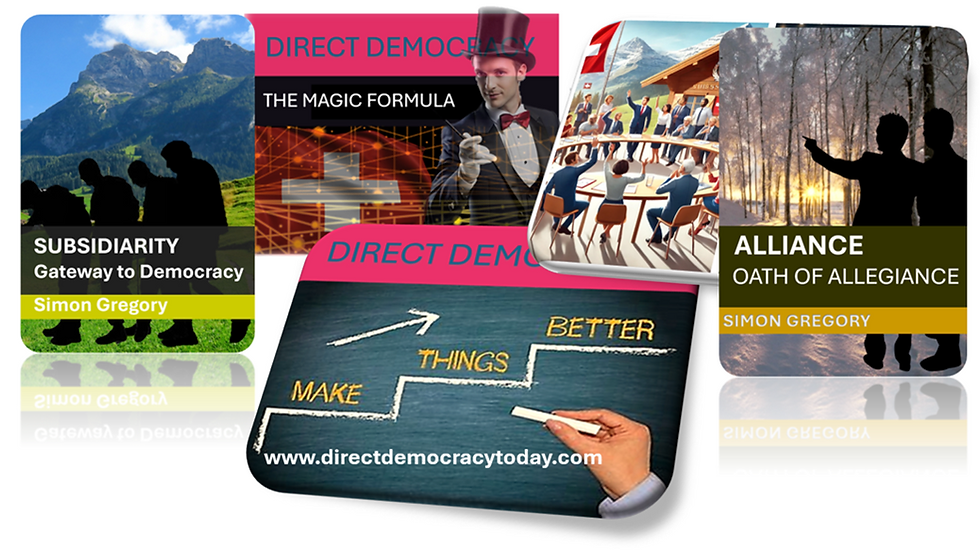THERE IS ANOTHER WAY
- 5thavenueartist
- Mar 29, 2025
- 3 min read
“A house divided against itself cannot stand.”
Abraham Lincoln
In many nations, politics is a battlefield where citizens are forced to pick sides in an endless war between parties, rather than uniting to "solve" real problems. The result? A divided people, more loyal to ideologies than to solutions, more interested in victory than in progress.
But Swiss style direct democracy offers a different path. It is one that does away with this destructive tribalism and instead empowers the people directly.
Swiss-style direct democracy is a system where the will of the people is not filtered through party machinery, not held hostage by politicians, but instead expressed through referendums and citizen initiatives.
From Conflict to Cooperation
“The best way to predict the future is to create it.” Peter Drucker
Under a two-party (or multi-party) system, the people are often told they must choose between two competing visions, neither of which “fully” represents them. They are pitted against each other in a battle where compromise is seen as weakness and where winning an election becomes more important than governing effectively. Look back, particularly in recent history, and you’ll notices that this is true.
In a system of direct democracy this false choice is dissolved, because direct democracy, Swiss style makes governance about policies, not parties.
It ensures that citizens are not forced to accept a bundle of policies they may not fully agree with just because a party offers no better alternative. Instead, they vote on individual issues, weighing each one on its merits. This encourages informed debate, not blind allegiance.
POLICIES – NOT POLITICIANS
Switzerland’s model has turned politics from a zero-sum game into a process of continuous national dialogue. When people vote on issues rather than politicians, they are forced to think critically, engage with facts, and seek out solutions rather than slogans. In doing so, they become more than voters—they become decision-makers.
The Results Speak for Themselves
“By their fruits you shall know them.”
Matthew 7:16
The success of Swiss democracy is not theoretical—it is measurable. Switzerland consistently ranks among the world’s leaders in quality of life, governance, economic stability, and personal freedom.
It boasts one of the most prosperous economies, one of the lowest corruption rates, and one of the highest levels of public trust in government.
Political Stability: While other nations swing violently between left and right with each election, Switzerland remains steady, because policies are decided by the people, not by changing party fortunes.
Economic Strength: Ranked among the most competitive economies in the world, Switzerland benefits from stable policies that promote innovation and fiscal responsibility.
Personal Freedoms: With one of the highest levels of civil liberties, Swiss citizens enjoy unparalleled personal and political rights.
Low Corruption: Transparency International consistently ranks Switzerland as one of the least corrupt countries, because power is decentralized, and no single party controls the system, That wasn’t always true in the banking sector, but it is today.
A Death Blow to Division
“None are more hopelessly enslaved than those who falsely believe they are free.”
Goethe
The illusion of choice in a two-party system is one of the greatest political deceptions of our time. People are told they have power when in reality, they are given only two narrow paths, both shaped by entrenched political elites. Swiss direct democracy shatters this illusion. It places power where it belongs—in the hands of the people.
Imagine a society where national debates are not reduced to partisan shouting matches but are instead guided by thoughtful deliberation. Where citizens engage with one another, not as enemies on opposing teams, but as collaborators shaping their collective future. Where political campaigns are not waged with fear and division, but with facts and ideas.
This is not a utopian dream. It is the lived reality of Swiss democracy.
It is proof that another way is possible.
Swiss direct democracy is an inconvenient truth for the world's dominant representative systems because it challenges several widely accepted notions about governance, political participation, and decision-making efficiency.




Comments